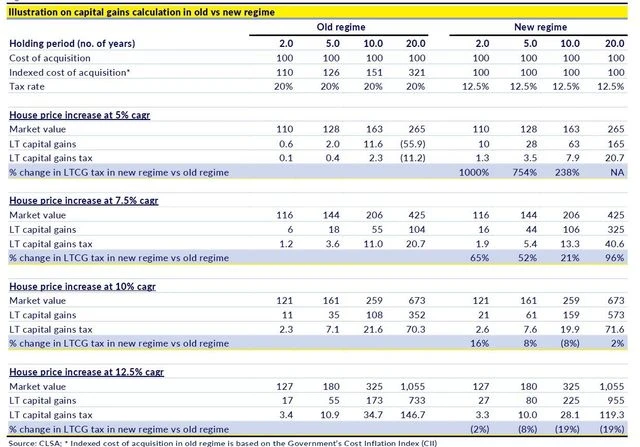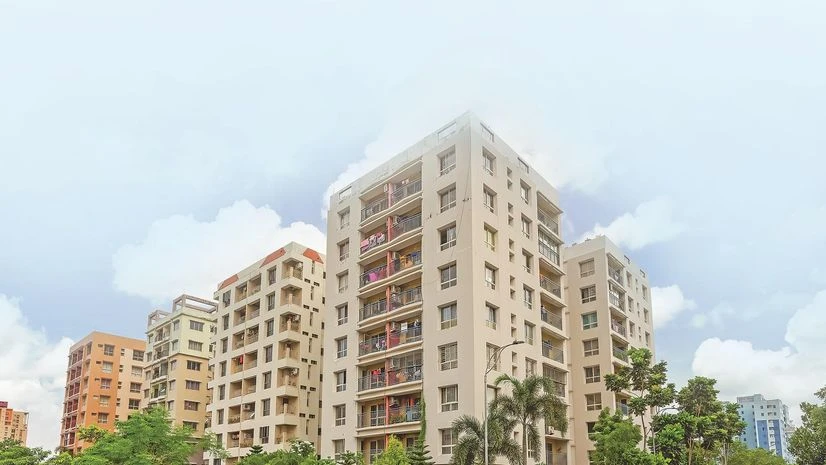Budget 2024: Budget 2024 presented by Nirmala Sitharaman on July 23 took away indexation on sale of property, while cutting the long-term capital gain (LTCG) on such a sale from 20 per cent to 12.5 per cent. The new norms are applicable with immediate effect, which is from July 23, 2024 onwards.
Analysts at CLSA believe the development is unlikely to impact end-users who sell their existing house and reinvest the proceeds in a new house. On the contrary, the development will impact those who sell their house / property and reinvest the proceeds in other asset classes.
The move, analysts said, was being done to rationalize taxes across all financial and non-financial assets.
"We believe the impact of this new regime is likely to be negative for investors with holding period of less than 5 years and where property price appreciation is moderate (less than 10 per cent per annum)," wrote Kunal Lakhan and Alekhya Mididoddi of CLSA in a recent post Budget 2024 presentation report.
Is there a grandfathering clause?
While the new norms are applicable from immediate effect, the government has clarified that the removal of indexation benefits will not be applicable to old properties held before 2001, which would continue to get indexation benefits.
Which property markets will be impacted most?
Markets like Bangalore, Hyderabad and Pune, which are end-user driven markets, CLSA said, will be the least impacted. Markets like the National Capital Region (NCR) and Mumbai, which have higher investor activity, are likely to be adversely impacted.
More From This Section
What will be the impact on sale of high-end property?
Further, Lakhan and Mididoddi believe that there will be no impact for super-luxury apartments with ticket size of over Rs 10 crore since in last year’s budget the government had capped the indexed cost of acquisition at Rs 10 crore.
“The removal of indexation benefit for LTCG will also impact the real estate industry and will slow down the resale of residential flats /lands. There is a fear that it may also increase the proportion of cash transaction in real estate deals, which will be again be counterproductive,” said analysts at SAMCO Securities in a note.
Impact on listed players?
Middle-income housing players like Sobha, Prestige Estates, Sunteck Realty, and Godrej Properties stand to gain, CLSA said, in the backdrop of a higher allocation to Pradhan Mantri Awas Yojna (PMAY) from Rs 251 billion to Rs 301.7 billion.
Bhavik Thakkar, CEO, Abans Investment Managers, too, suggests that the removal of indexation benefit for property and other assets will increase tax outflows.
“For example, if you had bought a property for Rs 100 in 2001 and sold it for Rs 500 in 2024, as per earlier tax regime (when indexation benefit allowed), the tax outflows even at 20 per cent rate would have been Rs 27.4 (as CII for FY25 is 363). As per Budget 2024 budget announcement, the tax outflow at 12.50 per cent rate would be Rs 50. This may potentially impact secondary sales of properties," he said.
Budget 2024 indexation benefit on property: New versus old regime
Assume you bought a property for Rs 7 crore in an upmarket locality. For ease of understanding and calculation, CLSA re-based has the acquisition cost of Rs 7 crore to 100, and used the government’s Cost Inflation Index (CII) for calculating indexed cost of acquisition, for calculating LTCG in the old regime.
The holding period of this property, too, has been assumed at 2, 5, 10 and 20 years and comparisons drawn across various holding periods with new regime (no indexation) to calculate the incidence of LTCG tax at lower rate of 12.5 per cent (versus 20 per cent in the old regime).
"We estimate that under the new regime the LTCG tax incidence is higher when the holding period is lower (less than 10 years) and property price appreciation is over 10 per cent p.a. Conversely, the LTCG tax in the new regime would be neutral/marginally beneficial for investors who hold it for longer duration (10 years and over) and where property price appreciation is healthy (over 10 per cent p.a.)," the CLSA note said.
)
)

)